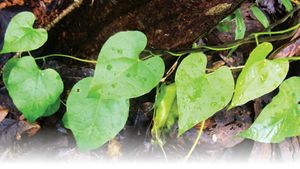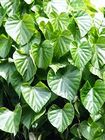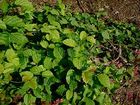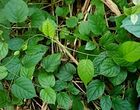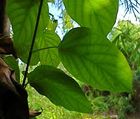Note: This is a project under development. The articles on this wiki are just being initiated and broadly incomplete. You can Help creating new pages.
Difference between revisions of "Tinospora cordifolia - Amrutha balli"
(→List of Ayurvedic medicine in which the herb is used) |
|||
| Line 44: | Line 44: | ||
==List of Ayurvedic medicine in which the herb is used== | ==List of Ayurvedic medicine in which the herb is used== | ||
| − | * [[ | + | *[[Citraka Harītakī]] |
==Where to get the saplings== | ==Where to get the saplings== | ||
Revision as of 17:05, 25 September 2018
Tinospora cordifolia which is known by the common names heart-leaved moonseed, guduchi and giloy is an herbaceous vine of the family Menispermaceae indigenous to the tropical areas of India, Myanmar and Sri Lanka.
Contents
- 1 Uses
- 2 Parts Used
- 3 Chemical Composition
- 4 Common names
- 5 Properties
- 6 Habit
- 7 Identification
- 8 List of Ayurvedic medicine in which the herb is used
- 9 Where to get the saplings
- 10 Mode of Propagation
- 11 How to plant/cultivate
- 12 Commonly seen growing in areas
- 13 Photo Gallery
- 14 References
- 15 External Links
Uses
Osteoarthritis, Pimples, Piles, Skin diseases, Diabetes, Blood pressure, Heart Diseases, Fever, Jaundice.
Parts Used
Chemical Composition
Terpenoids and alkaloids, Columbin, tinosporaside, jatrorhizine, palmatine, berberine, tembeterine, tinocordifolioside, phenylpropene disaccharides, choline, tinosporic acid, tinosporal, and tinosporon have been isolated from Tinospora cordifolia.[1]
Common names
| Language | Common name |
|---|---|
| Kannada | Amrutaballi |
| Hindi | Giloe, Gurcha |
| Malayalam | Nerinjil |
| Tamil | Seendal, Seendil kodi |
| Telugu | Thippateega |
| Marathi | Gulvel |
| Gujarathi | Galac, Garo |
| Punjabi | Gilo |
| Kashmiri | Amrita, Gilo |
| Sanskrit | Amrithavalli, Amritha, Madhuparni, Guduchika, chinnobhaava |
| English |
Properties
Reference: Dravya - Substance, Rasa - Taste, Guna - Qualities, Veerya - Potency, Vipaka - Post-digesion effect, Karma - Pharmacological activity, Prabhava - Therepeutics.
Dravya
Rasa
Tikta, Kashaya
Guna
Laghu (Light)
Veerya
Ushna (heat)
Vipaka
Katu (Pungent)
Karma
Balya, Deepana, Rasayana, Jvaraghna, Threedoshashamaka, Raktashodana
Habit
Identification
Leaf
| Kind | Shape | Feature |
|---|---|---|
| Simple | No trichomes were found. The cross section shows a single layered epidermis and a wide zone of cortex composed of 3 to 4 layers of endodermis | {{{3}}} |
.[2]
Flower
| Type | Size | Color and composition | Stamen | More information |
|---|---|---|---|---|
Fruit
| Type | Size | Mass | Appearance | Seeds | More information |
|---|---|---|---|---|---|
| {{{5}}} | {{{6}}} |
Other features
List of Ayurvedic medicine in which the herb is used
Where to get the saplings
Mode of Propagation
How to plant/cultivate
The land is ploughed, harrowed, and made weed-free.A basal dose of FYM (farmyard manure) @ 10 tonnes per hectare and half dose of nitrogen (75 kg) are applied at the time of land preparation.About 2500 cuttings are required for plantation in 1 hectare of land.No specific treatment is required before sowing[3]
Commonly seen growing in areas
subtropical and tropical climate area, sandy loam soil.
Photo Gallery
References
- ↑ THE AYURVEDIC PHARMACOPOEIA OF INDIA, PART-I, VOLUME-1, page no 53.
- ↑ "indian journal"
- ↑ "vikaspedia"
External Links
- Ayurvedic Herbs known to be helpful to treat Osteoarthritis
- Ayurvedic Herbs known to be helpful to treat Pimples
- Ayurvedic Herbs known to be helpful to treat Piles
- Ayurvedic Herbs known to be helpful to treat Skin diseases
- Ayurvedic Herbs known to be helpful to treat Diabetes
- Ayurvedic Herbs known to be helpful to treat Blood pressure
- Ayurvedic Herbs known to be helpful to treat Heart Diseases
- Ayurvedic Herbs known to be helpful to treat Fever
- Ayurvedic Herbs known to be helpful to treat Jaundice
- Herbs with Stem used in medicine
- Herbs with Roots used in medicine
- Herbs with Leaves used in medicine
- Herbs with common name in Kannada
- Herbs with common name in Hindi
- Herbs with common name in Malayalam
- Herbs with common name in Tamil
- Herbs with common name in Telugu
- Herbs with common name in Marathi
- Herbs with common name in Gujarathi
- Herbs with common name in Punjabi
- Herbs with common name in Kashmiri
- Herbs with common name in Sanskrit
- Habit - Vine
- Index of Plants which can be propagated by Seeds
- Index of Plants which can be propagated by Stem Cuttings
- Herbs that are commonly seen in the region of subtropical and tropical climate area
- Herbs that are commonly seen in the region of sandy loam soil
- Herbs
